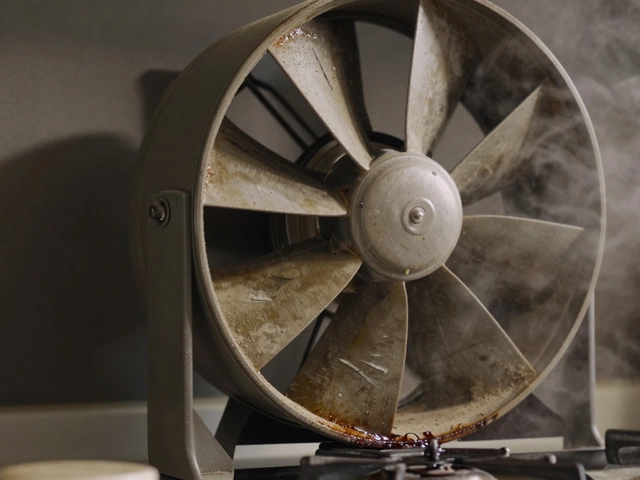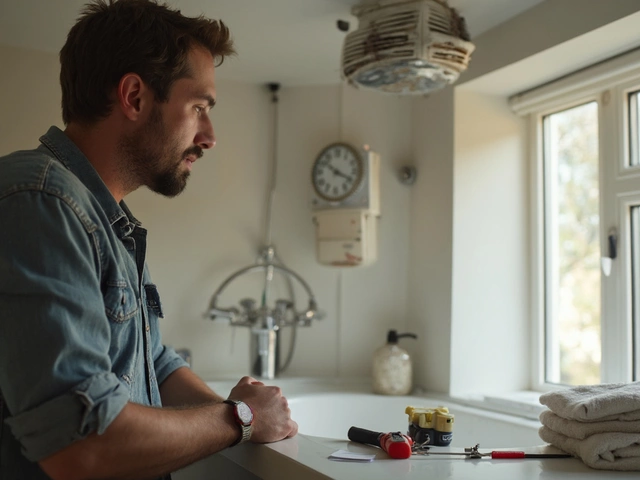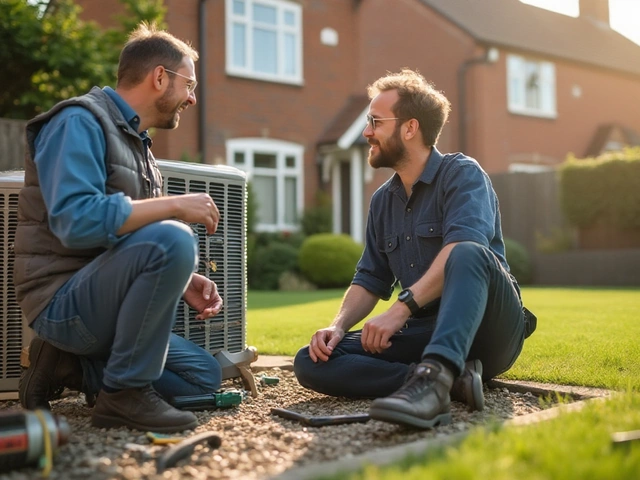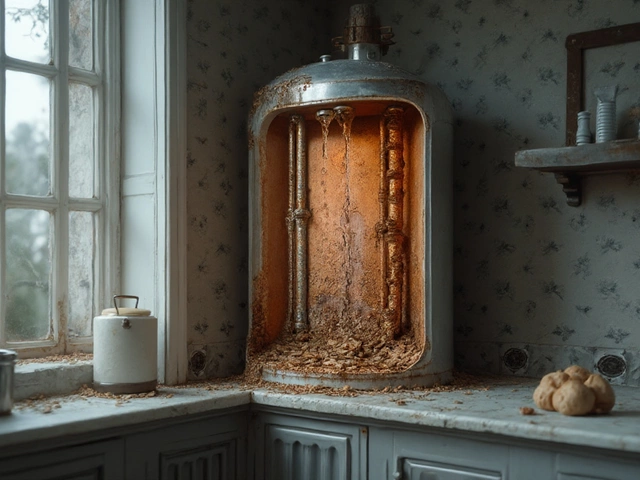In the bustling heart of any home, the kitchen, an often overlooked but essential appliance quietly goes about its business. The extractor fan, a device many take for granted, plays a pivotal role in keeping our living space pleasant and healthy. But what happens if we fail to switch it on?
Using an extractor fan isn't just about keeping unpleasant odors at bay. It serves as a guardian of sorts against moisture build-up, which can eventually lead to mold or mildew infestations. Without it, our kitchens might silently become breeding grounds for these unwelcome guests.
Neglecting to use an extractor fan doesn't only impact the kitchen. It touches the entire household, affecting indoor air quality and even health. We all yearn for a comfortable, safe environment to cook and enjoy meals, but forgoing the extractor fan introduces potential risks many might not consider until it's too late.
- The Purpose of an Extractor Fan
- Consequences of Skipping the Extractor Fan
- Impact on Indoor Air Quality
- Potential Health Risks
- Maintenance Tips for Longevity
- When to Seek Professional Repair
The Purpose of an Extractor Fan
The extractor fan is more than just a whirling mechanical device installed above your stove. It stands as a silent sentinel tasked with the critical duty of maintaining your kitchen's air quality. Designed to remove lingering particles from cooking, it captures smoke, grease, and the most pervasive culinary odors before they have the chance to spread throughout your living space. These fans may not be seen as glamorous gadgets, yet their contribution to a healthy home environment is undeniable. Let's explore how these workhorses perform their essential function.
An extractor fan operates by using a powerful motor to draw in polluted air, which then passes through filters to trap particulates. The refreshed air is either expelled outside or recirculated back indoors, depending on whether you have a ducted or ductless model. In ducted systems, the airflow is channeled through a series of ducts that release it outdoors, keeping indoor air fresh. This process is vital in reducing, and in some cases eliminating, unwanted odors and moisture that cooking generates in abundance. These fans are also pivotal in controlling humidity levels, helping to prevent mold and mildew, which love a damp environment.
Humidity control is not only about comfort but also about prolonging the life of your appliances and decor. Prolonged exposure to moisture can discolor walls, warp wooden cabinetry, and create rust on metallic fixtures. More so, the extractor fan minimizes grease buildup on surfaces, which otherwise could pose a cleaning nightmare. With the grease and grime kept in check, your kitchen remains a much more sanitary space. Consider that without this appliance, you'd be left with oily residue coating not just the kitchen itself but throughout the household.
Experts underscore the importance of a kitchen extractor fan. According to the Environmental Protection Agency (EPA), maintaining proper ventilation can dramatically improve indoor air quality, reducing pollutants by as much as 50%. Without ventilation, these contaminants could aggravate respiratory conditions.
"Proper ventilation serves as the frontline defense against indoor air pollution," notes air quality researcher Dr. James Hamilton.While you might enjoy the aroma of sizzling dishes, persistent exposure to fine particles can have adverse health effects over time.
Investing in a suitable extractor fan means choosing the right one for your kitchen size and cooking habits. Larger kitchens or those with island cooktops might require fans with higher cubic feet per minute (CFM) ratings, ensuring optimal performance. When a kitchen's airflow needs are systematically met, not only does it keep the air breathable, but it acts as your kitchen's invisible cleaning partner. Its ability to whisk away offensive smells and harmful particles only reinforces its indispensable place in any modern home.
Consequences of Skipping the Extractor Fan
If you’re guilty of frequently neglecting your kitchen extractor fan, it’s time to recognize the consequences that might not be so apparent at first glance. We often don’t realize the significance of this humble device until its absence begins to affect our day-to-day lives in subtle yet impactful ways. One of the primary functions of an extractor fan is to whisk away cooking fumes, including steam and smoke, which can otherwise linger and turn into unwelcome companions lingering around the house. Imagine preparing a decadent curry for dinner, only to find its scent stubbornly clinging to curtains and couches for days on end.
More than just odor control, neglecting to use an extractor fan has tangible effects on the indoor air quality of your home. Prolonged exposure to cooking smoke can introduce particulates into the air that could exacerbate respiratory conditions over time. This is especially concerning in today's homes, where energy efficiency has meant homes are more airtight than ever, making proper ventilation not a luxury, but a necessity. Surprising though it may be, studies have shown that indoor air can be significantly more polluted than the air outside, primarily due to inadequate ventilation practices. By keeping the extractor fan off, you’re inadvertently turning your kitchen into a sealed-off arena where moisture and unwanted particles can thrive.
Humidity is another silent saboteur amplified when an extractor fan isn’t used. Every casual tea brewed or pasta pot boiled releases water vapor into the air. When these moisture particles don’t have an escape route, they condense on surfaces and contribute to the growth of mold and mildew. This invisible threat, if left unchecked, can compromise not just the aesthetic of your kitchen, but pose potential health risks, triggering allergies or asthma in sensitive individuals. The financial aspect is also not to be underestimated. An extractor fan in good working order can help mitigate these issues, sparing homeowners from costly repairs and refurbishments down the line.
'Ventilation is the first step towards a healthier, more comfortable home environment,' says Dr. Susan Mayfield, a leading environmental health scientist. 'Neglecting ventilation appliances like the kitchen extractor fan can lead to several problems that might have serious implications for both health and property condition.'
Then there’s the matter of grease accumulation. Even the most careful of cooks can’t completely avoid the microscopic oil particles that cooking expels into the air. Skipping the extractor fan allows these greases to settle on kitchen surfaces, creating a tougher cleaning job and, in more professional settings, potential health code violations. Moreover, this build-up isn’t just unsightly; it can pose a fire hazard when left to accumulate unchecked, especially around heat sources like the stove.
Neglecting the fan can thus lead to heightened maintenance demands, as surfaces and appliances work harder to maintain their functionality and aesthetics. There’s a reason why experienced chefs often say 'A clean kitchen is a safe kitchen.' Regular use of the extractor fan is a simple yet powerful way to keep things in order. The choice is yours: make the small effort to ensure the fan is running when needed, or face the compounding issues that arise from seemingly harmless neglect.

Impact on Indoor Air Quality
When we think about the air within our homes, we often don't consider the role our kitchen appliances play, yet extractor fans are crucial in managing indoor air quality. Operating an extractor fan during cooking helps combat common pollutants such as nitrogen dioxide and carbon monoxide, which are otherwise released during stove use. Without venting these gases outside, they accumulate indoors, potentially reaching harmful levels. This invisible threat quietly affects not only the air we breathe but also pure comfort within our homes.
Cooking produces more than just delicious aromas; it generates steam, smoke, and grease-laden air. If not properly ventilated, these by-products can coat walls, ceilings, and furniture, creating an unpleasant sticky film over time. More troubling is the increase of indoor humidity, which, while seemingly innocuous, can invite unwanted consequences like mold growth. Mold doesn't just harm the structural integrity of a home; it can exacerbate health issues, especially for those with asthma and other respiratory conditions. As houses become more airtight in an effort to improve energy efficiency, the role of the extractor fan as a powerhouse of air exchange becomes evident.
Quality ventilation also acts as a temperature regulator. While securing adequate air exchange, the fan helps control unpleasant temperature spikes, ensuring a comfortable environment, especially while entertaining guests. Misuse of interior spaces by neglecting essential appliances like extractor fans is a common oversight. But being mindful of kitchen ventilation practices could dramatically improve the atmosphere at home, making it a haven of health and comfort.
"Proper air ventilation is the foundation of a healthy home environment," says Dr. Andrea Simmons, an expert in building health sciences. "Ignoring it can lead to a cascade of problems, from physical health impacts to increased energy costs." Ventilation is not just about keeping bad air out; it's about drawing good air in, balancing moisture, and maintaining top-tier living conditions.
For those living in urban areas where outdoor air might not be optimally clean, maintaining effective kitchen ventilation systems becomes even more critical. Homes without this can face additional burdens, particularly around cooking times when traffic emissions and outdoor pollutants mix with indoor ones. The cumulative impact of these pollutants can lead to decreased cognitive function, fatigue, or irritation of the eyes, nose, and throat. Hence, an extractor fan is not just a modern luxury but a critical tool in safeguarding health at home.
Potential Health Risks
The kitchen should be a haven of delightful culinary experiences, but neglecting the use of an extractor fan can turn it into a source of unseen health hazards. When cooking, particularly with gas appliances, the air fills with by-products like carbon monoxide, nitrogen dioxide, and even fine particulate matter. Without proper ventilation, these pollutants accumulate, compromising indoor air quality. Studies have shown that poor kitchen ventilation is linked to respiratory issues, particularly in children and the elderly, who are more susceptible to the effects of indoor pollution.
High humidity, a common kitchen nuisance without an extractor fan, creates a conducive environment for mold and mildew growth. Mold spores, when inhaled, can trigger allergic reactions ranging from mild irritations like sneezes and itchy eyes to severe asthma attacks. Asthmatic individuals or those with compromised immune systems face the greatest risks. Therefore, maintaining air quality by using an extractor fan is essential for keeping potential health threats at bay, not just for comfort but for safeguarding family well-being.
Moisture and fumes aren't the only adversaries. Cooking can release ultrafine particles and volatile organic compounds (VOCs) into the air, which inhaled over time can have deleterious health consequences. According to the Environmental Protection Agency (EPA), indoor concentrations of some pollutants are often two to five times higher than outdoor concentrations, and in some cases, these levels can exceed 100 times that of outdoor levels following certain activities like cooking. Hence, using an extractor fan is not merely a matter of preventing smells; it’s integral in reducing exposure to harmful substances.
"Good indoor air quality is fundamental for good health," notes Dr. David Jack, a respiratory expert and public health advocate. "Failure to ventilate environments, especially kitchens, can exacerbate chronic respiratory conditions and heighten infection risks."
Understanding the implications of poor ventilation and taking proactive steps is critical. Ensuring proper extractor fan use can mean the difference between a healthy kitchen and one that harbors invisible dangers. In the spirit of prevention, taking simple measures like regular maintenance or timely repairs of the fan can further benefit your household's health. So, as you plan your next meal, remember the role of the extractor fan goes beyond convenience; it's an unsung defender of your family's health.

Maintenance Tips for Longevity
Preserving the functionality and efficiency of your kitchen’s extractor fan is not just about maximizing its lifespan but also about safeguarding your home's air quality and avoiding unnecessary expenses. A well-maintained extractor fan runs smoother, quieter, and performs its essential task more effectively. One key aspect of keeping your fan in top-notch condition is routine cleaning to prevent the buildup of grease and debris. Grease traps clog the filters over time, which can lead to the motor straining and eventually burning out. Regularly cleaning the filters, at least every few months, ensures that your fan works efficiently and without undue stress.
Beyond cleaning, ensuring that the extractor fan's moving parts are in perfect working order is crucial. Loose blades or a weak airflow could indicate that the motor isn't functioning optimally, which is a sign that maintenance checks are overdue. Pay attention to any unusual noises during operation, as these can signal potential problems like motor bearings wearing out or the fan blades being off-balance. Regular inspection and early intervention can prevent minor issues from snowballing into costly repairs. Additionally, replacing worn-out parts as soon as you identify them can extend the lifespan significantly.
Baking canola or vegetable oil for a few minutes under the hood is a traditional method trade professionals use to assess airflow and extraction levels. This simple, DIY technique highlights any blockages in the vent system by monitoring the fan's ability to remove smoke or steam efficiently. If your fan doesn’t clear the steam within a reasonable time frame, it might be worth calling in professional help to check for blockages or wiring problems.
"Regular maintenance doesn't just save time and money; it ensures the healthier air quality for everyone in the home," says Sarah Lonsdale, a home improvement expert and writer for The Guardian.
For those more technically inclined, periodically checking the ducts for obstructions or misalignments can be a good habit. This ensures that the airflow is unobstructed and that the kitchen ventilation process is as efficient as possible. Straight and short paths for ducts minimize resistance and reduce the load on the fan. Pipes should be cleaned annually to remove any grease buildups that might clog the system.
A consistent schedule for replacing active carbon filters is another way to prolong your extractor fan's service life. These filters are often used in kitchens where external venting isn't possible, and they work by absorbing smoke, odors, and moisture. Over time, their efficiency decreases, so it’s essential to replace them as recommended – usually every six months to a year. Ensuring they are routinely replaced will help keep the kitchen smelling fresh and free of lingering odors.
Lastly, always ensure that the external vents are free from blockages such as leaves or other debris that could impede airflow. Regularly inspect these vents, especially if they are located outdoors, to make sure they are clear and unblocked. This prevents back-pressure on the system, which can affect both the performance and lifespan of your fan. Fan maintenance isn't just a chore but an investment into the longevity and efficiency of your home's air purification and ventilation capabilities. By following these practical tips, you can ensure your kitchen remains a safe, pleasant environment.
When to Seek Professional Repair
Many homeowners take pride in their ability to handle minor home repairs, and the draw to fix an extractor fan may be tempting. Yet, there are times when the skills of a professional are not only beneficial but essential. When the fan emits strange noises, such as grinding or screeching, it’s likely beyond a simple DIY fix. These noises can indicate a failing motor or misaligned components that require expert attention to avoid further damage. Similarly, if the fan is not effectively removing cooking odors or smoke as it once did, it may be a sign of a blockage or malfunction that you can’t resolve with a quick clean.
Sometimes an extractor fan simply refuses to operate. In such cases, the problem might lie in the electrical connections or internal wiring, areas that demand a professional’s touch to ensure safety and proper functioning. Given the complexity of electrical components, attempting a repair without the proper knowledge can pose risks such as electric shock or irreversible damage to the unit. In Brisbane's humid climate, a non-functioning fan can accelerate problems like mold growth, with dire consequences for your indoor environment.
Consulting a professional also becomes necessary when considering an upgrade or replacement of your extractor fan. With advancements in technology, modern fans come equipped with energy-efficient and quiet operation features that may require specialized knowledge for installation. DIY installation can sometimes lead to improper fit or reduced performance, resulting in energy inefficiencies or premature wear. As noted by Australian Home Journal, “A professionally installed fan not only meets safety standards but also maximizes airflow efficiency.”
“Regular check-ups by a certified technician can extend the lifespan of your kitchen appliances by up to 30%.”
If your extractor fan’s warranty is still in effect, professional attention is usually required to maintain its validity. Attempting to repair the fan yourself might void the warranty, putting you at a financial disadvantage should subsequent repairs be needed. It's always advisable to check warranty terms and rely upon authorized service centers for repairs during this period. For those tasked with the daily hustle and bustle of kitchen duty, the smooth functionality of an extractor fan is essential not only for immediate comfort but also for safeguarding the home against potential air quality issues.
In some cases, particularly for older extractor fans, repairs may not be the most cost-effective option, particularly if the fan has a history of frequent breakdowns. A professional can provide an objective assessment regarding whether a repair or replacement is justifiable. This expertise ensures you make informed decisions considering both the short-term cost and long-term benefits. Emphasizing the necessity of periodic maintenance checks by professionals could save against unplanned expenses in the future.





